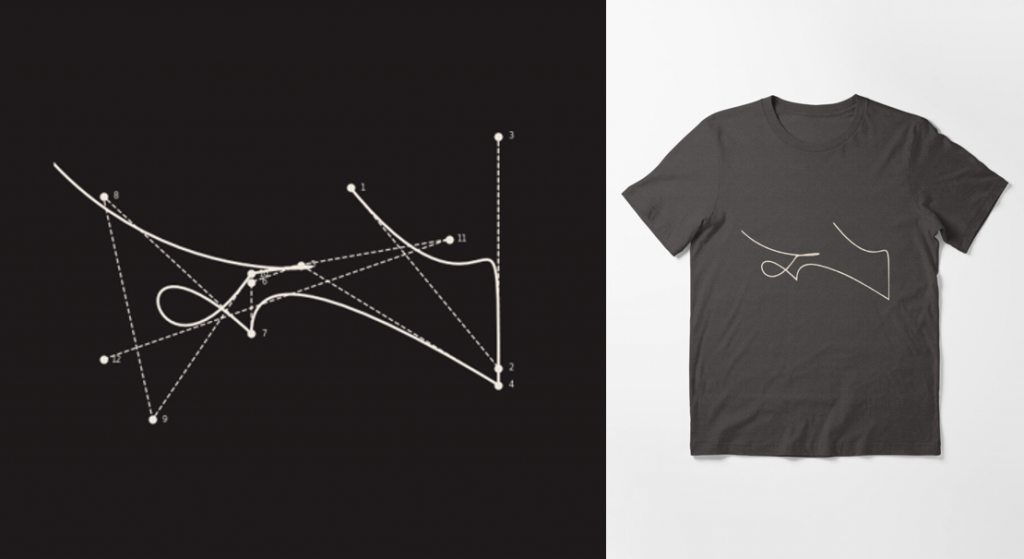This Python Data Art Course is a live, online introduction to creative coding and data art. During the course, you’ll learn how technology can help you create small and personal data art.
Here’s an example of a data visualisation that you’ll be able to make at the end, printed on a t-shirt:

The cool thing is this line is based on music lyrics and generated using just code.
Is this something for you?
The course introduces you to Python through a data art project. You’ll get hands-on experience with writing Python code and how it can help you as a data professional.
Course in a nutshell
- You’ll work in a group of max. 8 people
- Four online workshop of ~1,5 hour each
- Introduction to python programming through data art
- Have your own personal data art piece by the end of the session
- Price €399
For more details, read below.
Course context
The impact data has on our society is growing. Data and technology are behind some of the most successful companies. Being able to work with data through code is a valuable an scalable asset for any data professional.
Course objective
This course is designed to introduce you to Python through creative coding and data art. During the course, you’ll generate your own digital art piece using a language model.
Course outline
During the course, we’ll explore python by going through the process behind my personal data art project. With my step-by-step guide and technical support, you’ll use technology to create your very own piece of data art! The program consists of the 4 sessions:
- Theory & outline: during our first session, I’ll take you through the origin story of my data art project, we’ll discuss the outline of the course and generate ideas for your own project.
- Getting started with Python: in the second session, I’ll help you get started with Python, we’ll work on some basic exercises, you’ll learn how to read files, analyse them using an API, and store the results in a csv.
- Visualising data: during our third session, we’ll visualise the data in various ways and I share some tricks that help you get from a basic plot to a minimalistic art piece.
- Showcase: during the final session, each participant shares their work. What
Benefits of taking the course
Your main benefit: you’ll get hands-on with the basics of working with data in Python. And you go home with the skills to make your own personal piece of data art!
⏱️ Course timing, pricing & requirements
It’s a live online course that lasts four sessions of ~1.5 hours each. They’ll be hosted in the evening (Central European Time). The pricing is €399,- per person.
Some basic knowledge of programming (in Python or another language) is required. Besides that, you’ll need a working Google Cloud account (instructions will be shared after you enrol).
☑️ Enrol for the next edition
There is currently no new edition is planned for this course. If you want to take the course, either alone or as an in-company group training, reach out to me here.
⭐ Course reviews
I always have a good time teaching this course. But what do people taking the course think?
Fontys University of Applied Sciences
I teach the course to a group of Creative Technology students at the Fontys University of Applied Sciences (Eindhoven, The Netherlands). Here’s how Mijke Ellen van der Zee, lecturer at Fontys, looks back at it:
Erik directly connected to our students with his Small Data Art Course. With his clear and well-structured course, he enabled students to make both beautiful and personal work. The abstract translation of music lyrics to visualisations invites them to add a personal touch. Interesting conversations that started throughout the course and a clear passion for music were the icing on the cake.
Online Course
Here’s what someone taking the online course had to say:
The course has clear structure, discusses real-world data art examples, and uses interactive teaching methods. It is an excellent learning experience!
Other course reviews
Besides this course, I teach other courses about various data subjects. Here’s a review from one of my data visualisation courses:
Erik’s energy and expertise on data and communication is really inspiring. It was great to work on cases to put our learnings into practice.
These reviews reflect what I find important in my courses: inspiration and interaction.
